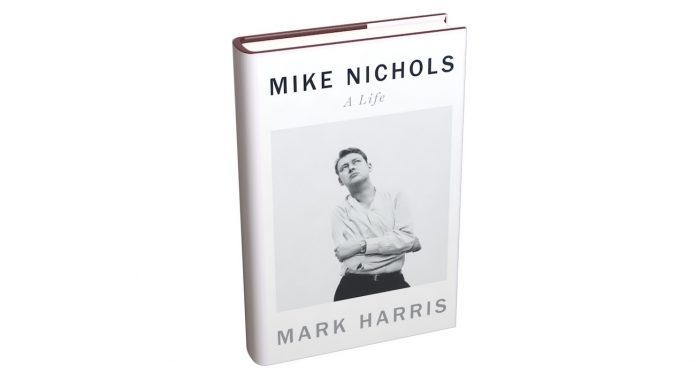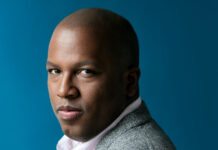[This column appears in the March/April 2021 issue of Boston Spirit magazine. Subscribe for free today.]
Author Mark Harris knew it was “going to be weird” to write about the 2003 HBO miniseries “Angels in America” for his biography of director Mike Nichols. Harris, a longtime entertainment journalist, also happens to be the husband of playwright Tony Kushner, who’d adapted his Pulitzer Prize-winning “Gay Fantasia on National Themes” for the six-part series.
“I had firsthand information about how certain things played out because I was there. I remember it vividly,” says Harris in a telephone interview. “I worried the whole time—am I going to have to introduce myself as a character? Am I going to have to break the fourth wall and talk to the reader? Ultimately I decided … to just write it like every other chapter of the book and maybe more importantly to report it like any other chapter of the book; to get people on the phone, sit them down for interviews, find out things that I didn’t know.”

Harris, who lives in New York and Provincetown, shapes his meticulous research and reporting into lively prose and perceptive context. “Mike Nichols: A Life” spans Nichols’ boyhood in pre-war Berlin to his death in 2014 as it details his “two parallel fifty-year careers” in film and theater, says Harris. Nichols directed Broadway hits from “The Odd Couple” to “Monty Python’s Spamalot” and many films including his auspicious debut “Who’s Afraid of Virginia Woolf?” and “The Graduate.”
Although Harris first met Nichols during HBO’s “Angels in America,” he’d interviewed him extensively in 2007 for his first book, “Pictures at a Revolution: Five Movies and the Birth of the New Hollywood” which includes Nichols’ seminal 1967 film “The Graduate.” But Harris didn’t consider the possibility of a biography until after Nichols’ death. “I don’t consider myself a biographer. While [Nichols] was alive, I said to him several times, ‘Why aren’t you writing your autobiography?’ He had no interest in that. Toward the end of his life he started to change his tune a little bit; he talked about [writing] a book in which he’d go through all his work, not a biography, but a show-by-show, movie-by-movie retrospective. But it didn’t come to anything.”
Harris spent five years researching and writing the book after first asking permission from Nichols’ widow, television journalist Diane Sawyer, as well as Nichols’ three children from earlier marriages. “I went to Diane and Mike’s son and daughters in advance and said, ‘I don’t want to do this without your consent’ and they were incredibly kind in granting it without reservation,” says Harris. “They never asked to see the manuscript in advance, never asked that I not include anything. If I had not been given that consent, I would not have done it. I’d have moved on to a different project.”
Harris conducted interviews with dozens of entertainment luminaries but the most important, he says, was with Elaine May, now 88, whose groundbreaking improvisational comedy routines with Nichols, from their early days in Chicago to their 1960 Broadway hit “An Evening with Mike Nichols and Elaine May,” have influenced comics for generations.
“What I didn’t realize when I started doing research is how much of the groundwork for the way Mike thought as a director and the way he interacted with actors and the way he interacted with women—Mike had an easier time collaborating with women than most other male directors of his generation—was how much all of that was laid into him by his early and mid-twenties by working with Elaine May and how much that partnership really defined him,” Harris says.
“One of the things that moved me about Mike’s story is what an amazing thing to have had a creative kindred spirit for 60 years. Even though the part where they were involved as performers was relatively brief, they were always in each other’s lives, they were always working on something together … how extraordinary to have that kind of trust where, in your 20s and 50s and 80s, you can show someone a script and say, ‘What do you think? Can I do this?’”
May wrote the screenplay for the 1996 movie “The Birdcage,” which Nichols directed. His career, notes Harris, “went all the way from things that happened long before I was born to ‘The Birdcage’ [released] when I was movies editor at Entertainment Weekly, so I had the strange experience of being in the library and finding an old piece on ‘The Birdcage’ that looked vaguely familiar and then realizing I’d assigned and edited the piece. … Nathan Lane was very helpful for this chapter. Obviously, I could not talk to Robin Williams, although the biography was helpful. [Lane] was smart and acutely perceptive about where everyone stood at exactly that moment in terms of gay culture and LGBT acceptance.”
Nichols’ personal life was often tabloid fodder. He was married four times and dated, among many other women, Jackie Kennedy and Gloria Steinem. In a short but intriguing section of the book, Harris acknowledges rumors that Nichols and his close friend, photographer Richard Avedon, were once lovers.
Harris diligently investigated but found no evidence to substantiate the rumor. “I went into the project saying that anything I found out would help me to a fuller understanding of who Mike Nichols was. Certainly [a gay relationship] is the last kind of information I would have excluded if I had gotten any kind of credible support for it. I did not.”
Harris’ recreation of Broadway’s golden age and Hollywood from the 1960s to 2007 is delicious but also bittersweet.
“I never imagined when I started this book or even when I finished it at the end of 2019 that it would be coming out in a world when we still can’t go to the theater,” says Harris. “So if I’ve contributed anything that conveys how exciting and valuable it is and how much it deserves to be missed and how lucky we’ll all be to have it back, then I’m very happy.”
Not a subscriber? Sign up today for a free subscription to Boston Spirit magazine, New England’s premier LGBT magazine. We will send you a copy of Boston Spirit 6 times per year and we never sell/rent our subscriber information. Click HERE to sign up!









